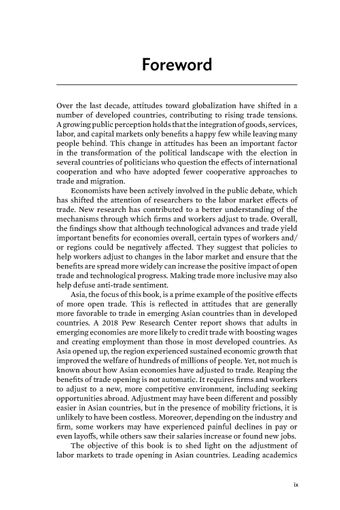- Home
- Books
- Trade Adjustment in Asia
- Chapter
Responses to Trade Opening: Evidence and Lessons from Asia

- By: World Trade Organization
- Source: Trade Adjustment in Asia , pp 17-64
- Publication Date: September 2019
- DOI: https://doi.org/10.30875/1873f02d-en
- Language: English
Over the last 3 decades, several developing countries have liberalized their trade regimes. This may have happened either due partially to conditionalities imposed by international organizations, such as the International Monetary Fund in response to emergency requests for loans, in the context of a country’s accession to the World Trade Organization, or as a result of the signature of a preferential trade agreement. In many cases, the reforms may have stemmed from a country’s own disappointment with its growth performance during its import substitution phase. While movement toward free trade is expected to expand the size of the overall economic pie, such changes always produce both losers and winners. In fact, it is this creation of winners and losers, along with “individualspecific uncertainty” (Fernandez and Rodrik 1991) about who benefits and who loses from reforms, that has led to the delays in trade reforms, appropriately called “status quo bias.”
-
From This Site
/content/books/9789287050229s003-c001dcterms_subject,pub_countryId-contentType:WorkingPaperSeries -contentType:Periodical -contentType:BookSeries -contentType:ReportSeries105


